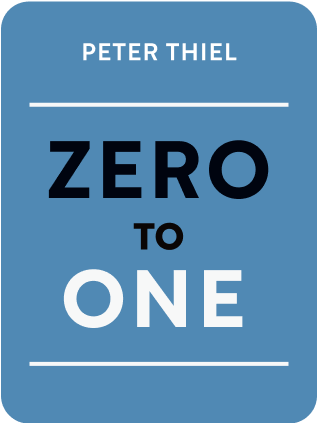

This article is an excerpt from the Shortform summary of "Zero To One" by Peter Thiel. Shortform has the world's best summaries of books you should be reading.
Like this article? Sign up for a free trial here .
Can monopolies be good? What are the advantages of monopolies?
According to Peter Thiel, monopoly is better for society. When a business has a monopoly (meaning it faces no significant competition in the market where it operates), it has the freedom to consider the welfare of its employees and the broader impact of its products and operations on society because profits are assured.
Here’s why monopoly is better for society, according to Peter Thiel.
Myths About Competition and Monopoly
Thiel observes that anyone starting a company needs to decide what kind of company to start. Of course, there’s only one kind of company that’s worth starting: a profitable one. To be profitable, your company needs to create something of value and monetize a portion of the value that it creates.
According to Peter Thiel, monopoly and competition are commonly misunderstood. He argues that to secure a fair share of the value that your company creates, you need to be a monopoly. If you have direct competitors, price competition will drive your profit margins to zero. He illustrates this concept by comparing the economic models of “perfect competition” and “monopoly.”
Perfect Competition
In economic theory, “perfect competition” happens when there are many suppliers of a given product and there is no appreciable difference between their products. Thiel says classical economists consider this an ideal situation because the market is governed completely by supply and demand: If demand increases, prices will rise, motivating suppliers to increase production or new suppliers to enter the market. If supply overshoots demand, prices will fall and suppliers will cut back or go out of business. So in the long run, supply and demand remain perfectly in balance.
According to Thiel, this is precisely the problem: When supply and demand are perfectly in balance, suppliers are just breaking even on production costs, not making a profit.
Monopoly
In a monopoly, one company controls the market and sets prices as it sees fit. This allows the company to incorporate a profit margin into its price structure.
Thiel observes that many Americans see monopolies as a bad thing, because the American economy is based on capitalism, and they associate capitalism with competition. He asserts that this viewpoint is flawed: The profit motive is what drives capitalism, and monopolies are the only type of business where long-term profits are possible.
That said, Thiel concedes that not all monopolies are created equal. If a company manages to corner the market on the supply of a necessary resource and then arbitrarily raises prices, the company prospers at society’s expense. Understandably, historical instances of this have given monopolies a bad name, especially when companies cornered the market through dishonest means.
However, Thiel contends that this can only happen in a static market. Vertical progress redefines markets and makes new resources available, so monopolies are always temporary. If you create a monopoly by inventing a revolutionary technology, your monopoly will only last until someone else invents a technology that eclipses it.
The knowledge that your monopoly is temporary should motivate you to invest your profits in developing other new technologies. This kind of creative, technological monopoly that both drives and facilitates technological advancement is what Thiel advocates.
Lying About Competition
In Thiel’s experience, most companies and markets closely approximate either a monopoly or a case of perfect competition. And most of them lie about it, because being seen as a monopoly makes your company vulnerable to antitrust suits, and being seen as an undifferentiated supplier in a perfectly competitive market makes it hard to raise investment capital.
Thus, according to Thiel, monopoly companies tend to argue that the market they control is just a small piece of a larger market. For example, a company with a monopoly on genetically engineered crops might claim to own just a small share of the global market for agricultural products. They may even introduce other products for the sole purpose of competing in other markets that they don’t dominate to make their claims of competition seem more legitimate. For example, they might sell a few proprietary seed drills, just so they can point out that John Deere is out-competing them in the machinery sector of the agricultural market.
By contrast, non-monopoly companies tend to claim that they are unique by presenting themselves as dominant players in an arbitrarily specific market sector. For example, Unique-ARs Corporation could legitimately claim to be the largest producer of hunting rifles with honeycomb-pattern handguards in central Idaho, even though they hold only a tiny share of the American sporting rifle market.
Either way, Thiel cautions that companies that misrepresent their status in the market are in danger of failing if they believe their own lies.
Monopolies Are Better for Society
Thiel argues that monopolies are good for society, as well as for business. For example, monopolies can afford to pay their employees what they need for financial security and set their prices to assure enough profit that these wages are sustainable. Meanwhile, competitive companies have to pay the lowest wages they can get away with. Similarly, monopolies can choose to use alternative energy sources that may be more environmentally sustainable in the long run, but are more expensive up front, while competitive companies must use whatever energy sources will keep their short-term costs low.
Thiel brings up the subject of patents, remarking that patents exist because the government recognizes the value of temporary, creative monopolies. The opportunity to secure years of monopoly profits provides incentive to invest in research and development. And the incentive is recurrent because the patent is temporary. And even if patents weren’t temporary, every technology has the potential to be eclipsed by a better one. So companies have to keep innovating to maintain their monopoly status. The resulting creative development makes society better by creating new categories of things and expanding consumers’ options.

———End of Preview———
Like what you just read? Read the rest of the world's best summary of Peter Thiel's "Zero To One" at Shortform .
Here's what you'll find in our full Zero To One summary :
- Why some companies genuinely move the world forward when most don't
- How to build a company that becomes a monopoly (and why monopolies aren't bad)
- Silicon Valley secrets to selling products and building rockstar teams






